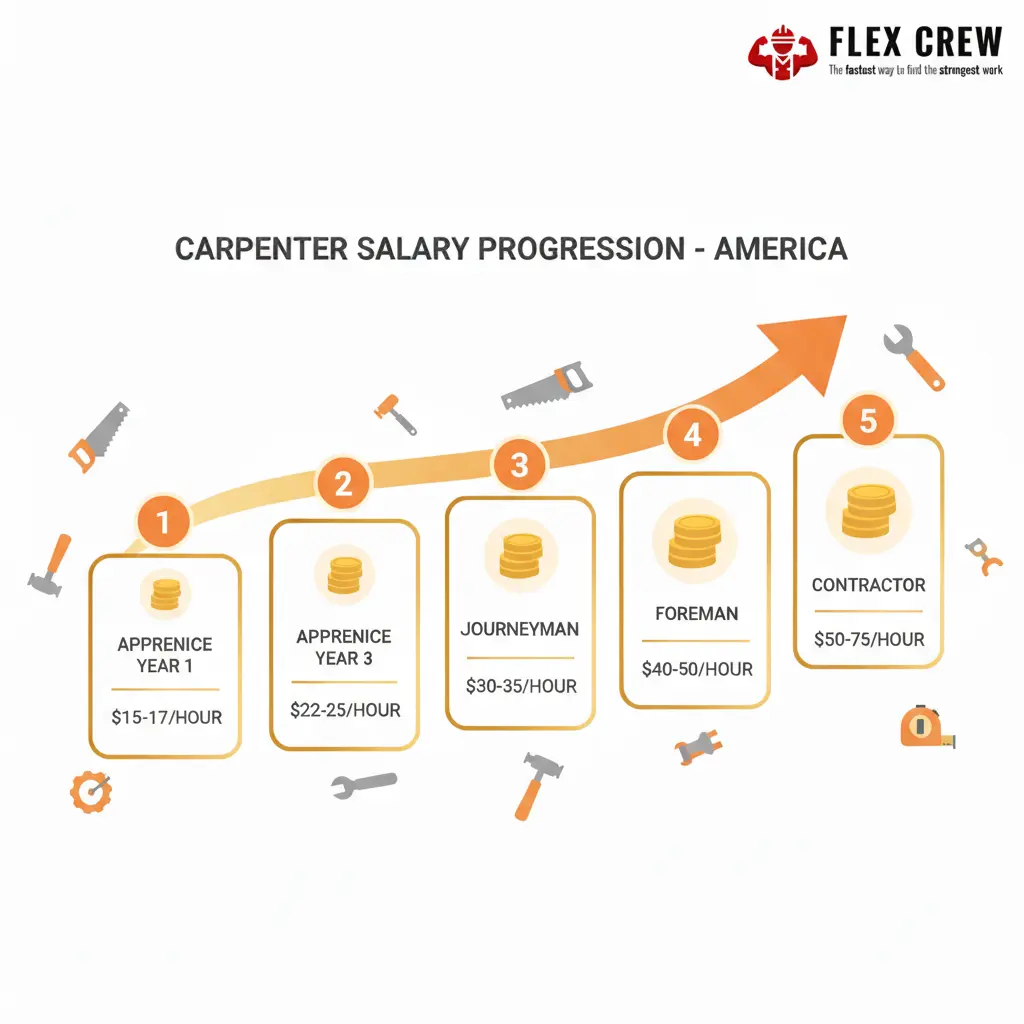The American job market is experiencing a massive shift. While college graduates struggle with $37,000 in average student debt, skilled tradespeople are landing six-figure jobs straight out of apprenticeships. Trade careers represent one of the smartest paths to financial stability in today's economy.
What Are Trade Careers?
Trade careers are skilled professions that require specialized training through vocational schools, apprenticeships, or on-the-job learning programs. Unlike traditional four-year degrees, these careers focus on hands-on skills that directly translate to real-world job opportunities.
The construction industry alone employs over 7.6 million Americans, with trade professionals forming the backbone of infrastructure development across the nation. From the skyscrapers in Manhattan to the suburban homes in Texas, skilled tradespeople build America.
High-Demand Trade Careers in Construction
Electricians: The Power Players
Electricians earn an average of $56,000 annually, with experienced professionals in major metropolitan areas commanding $80,000 or more. The job requires apprenticeship and licensing, but offers excellent job security since electrical work exists everywhere.
One major advantage of electrical work is longevity. Unlike physically demanding trades, electricians can work well into their 60s and 70s. The work involves problem-solving, blueprint reading, and technology integration - skills that remain valuable throughout a career.

Plumbers: Essential Service Providers
Plumbing professionals make around $53,000 yearly as employees, but those who start their own businesses regularly earn six-figure incomes. The 14% projected growth rate reflects America's ongoing construction boom and aging infrastructure needs.
Plumbers enjoy geographic flexibility - every city needs reliable plumbing services. Whether you're in rural Montana or downtown Chicago, skilled plumbers stay busy year-round.
HVAC Technicians: Climate Control Specialists
HVAC (Heating, Ventilation, and Air Conditioning) technicians earn approximately $47,000 annually with 13% job growth projections. These professionals maintain comfortable environments in homes, offices, and industrial facilities.
The seasonal nature of HVAC work can be advantageous. Busy summers and winters provide opportunities for overtime pay, while slower seasons allow for vacation time and continuing education.
Welders: Metal Masters
Welding offers unique earning potential depending on specialization. Basic welders might start around industry averages, but specialized welders in oil and gas, underwater welding, or aerospace can earn $100,000+ annually.
The key to welding success lies in continuous skill development. Advanced certifications in specialized techniques create opportunities for premium pay rates and consistent work.
Heavy Equipment Operators: Moving Mountains
Operating cranes, bulldozers, and excavators requires skill and responsibility. Heavy equipment operators average $46,000 annually, with specialized crane operators earning significantly more due to the high-stakes nature of their work.
This career path requires licensing and apprenticeship training, but offers the satisfaction of seeing massive projects come to life through your expertise.
Why Trade Careers Beat Traditional College Paths
Financial Advantages
Trade careers offer immediate earning potential without student loan debt. While college graduates spend four years accumulating debt, trade apprentices earn while learning valuable skills. This head start compounds over decades.
Consider this comparison: A college graduate starts earning at 22 with $37,000 in debt. A trade apprentice begins earning at 18 and completes training by 21 with zero debt and three years of work experience.
Job Security and Demand
Construction and infrastructure maintenance create consistent demand for skilled trades. Unlike jobs that can be outsourced or automated, trade work requires physical presence and human expertise.
The Bureau of Labor Statistics projects faster-than-average growth for most trade careers through 2031. As older tradespeople retire, opportunities increase for new workers entering these fields.
Entrepreneurship Opportunities
Trade skills translate directly into business ownership potential. Many successful contractors started as apprentices, learned their trade, then launched companies that employ dozens or hundreds of workers.
FlexCrew USA connects skilled trade professionals with opportunities that can lead to business partnerships, specialized project work, and long-term career advancement.
Real-World Trade Career Challenges
Physical Demands and Working Conditions
Trade work often involves physical challenges that office jobs don't present. Construction sites lack climate control, running water, and comfortable break areas. Weather conditions directly impact work schedules and comfort levels.
Workers regularly face temperature extremes, from scorching summer heat to bitter winter cold. The physical nature of most trade work can lead to wear and tear on the body over time.
Travel and Commute Considerations
Unlike office workers who might live near their workplace, trade professionals travel to job sites. Commutes ranging from 30 minutes to 2.5 hours are common, depending on project locations and local market conditions.
Construction projects move locations frequently, requiring flexibility and travel. Some specialized trades involve extensive travel for high-paying assignments, but this lifestyle isn't suitable for everyone.
Limited Benefits and Time Off
Many trade positions offer minimal paid time off compared to traditional office careers. Some companies provide no vacation days or sick leave, operating on a "work available days, don't work unavailable days" system.
Healthcare benefits and retirement planning often require individual responsibility rather than comprehensive employer packages.
Breaking Into Trade Careers
Education and Training Options
Multiple pathways lead to trade careers:
Apprenticeships combine paid work experience with classroom instruction. Union apprenticeships often include training costs in membership dues, while non-union programs may require upfront tuition payments.
Vocational schools offer concentrated training programs lasting 6 months to 2 years. Costs typically range from $15,000 to $40,000, significantly less than four-year college programs.
On-the-job training allows immediate entry with skill development through experience and mentorship.
Building Experience Through Staffing Partners
Professional staffing companies like FlexCrew USA provide entry points into trade careers by connecting workers with projects that build experience and industry connections. Starting with temporary assignments allows exploration of different specialties before committing to specific career paths.
Licensing and Certification Requirements
Most trade careers require state licensing or industry certifications. Requirements vary by location and specialty, but typically involve completing approved training programs and passing examinations.
Research your state's specific requirements early in your career planning process to ensure compliance and optimal preparation.
Maximizing Trade Career Success
Skill Development and Specialization
Continuous learning separates successful trade professionals from average performers. Advanced certifications, new technology training, and specialized techniques command premium pay rates.
Business and Customer Service Skills
Technical skills alone don't guarantee success. Communication, customer service, and basic business knowledge help trade professionals advance to supervisory roles or business ownership.
Networking and Professional Relationships
Strong professional networks provide job opportunities, partnership possibilities, and industry insights. Industry associations, contractor relationships, and peer connections create career advancement pathways.
FlexCrew USA facilitates these professional connections by placing skilled workers with established contractors and growing companies across multiple markets.
The Future of Trade Careers
Infrastructure investment, renewable energy projects, and ongoing construction needs ensure long-term demand for skilled trade professionals. Green building initiatives, smart home technology, and sustainable construction methods create new specialization opportunities.
Trade careers offer stability, growth potential, and financial freedom without traditional college requirements. For Americans seeking practical career paths with immediate earning potential, trade professions represent some of the best opportunities available in today's job market.
Frequently Asked Questions
Q: What trade careers pay the most without requiring a four-year degree? A: Elevator technicians ($79,000), dental hygienists ($74,000), and radiation therapists ($82,000) offer the highest average salaries. In construction specifically, specialized welders, crane operators, and experienced electricians can earn six-figure incomes.
Q: How long does it take to complete trade career training?
A: Training duration varies by trade. Most programs require 6 months to 2 years for initial certification, with apprenticeships lasting 2-4 years. This timeline is significantly shorter than traditional four-year college programs.
Q: Are trade careers available in all US states and cities?
A: Yes, construction and infrastructure maintenance create demand for trade professionals nationwide. Rural areas, suburban communities, and major metropolitan areas all require skilled tradespeople, though pay rates vary by geographic location.
Q: Can women succeed in construction trade careers?
A: Absolutely. While construction trades have traditionally been male-dominated, women are increasingly successful in electrical work, plumbing, HVAC, and other specialties. Many companies actively recruit female workers to diversify their workforce.
Q: How do I find entry-level trade career opportunities in my area?
A: Contact professional staffing companies like FlexCrew USA that specialize in construction and trade placements. Local union halls, vocational schools, and contractor associations also provide job placement assistance and apprenticeship information.
Q: What's the difference between union and non-union trade work?
A: Union positions typically offer higher wages, comprehensive benefits, and formal apprenticeship programs with included training costs. Non-union work provides more flexibility but may require individual responsibility for benefits and training expenses.
Q: Do trade careers offer opportunities for advancement and business ownership?
A: Yes, many successful contractors started as trade apprentices. Skills learned in construction trades translate directly to business ownership opportunities, project management roles, and specialized consulting services.
Q: Are trade careers recession-proof?
A: While no career is completely recession-proof, infrastructure maintenance, emergency repairs, and essential construction services continue during economic downturns. Trade skills provide more job security than many other industries during challenging economic periods.



